
views
- If your friend is showing symptoms of depression, encourage them to seek treatment right away, and offer to help them schedule an appointment.
- Offer practical support, like helping out with chores, as well as emotional support, like spending quality time together.
- Remember to take care of your own wellbeing while you support your friend. Make time to do the things you love, practice self-care, and ask for help if you need it.
Supporting Your Friend Who Has Depression
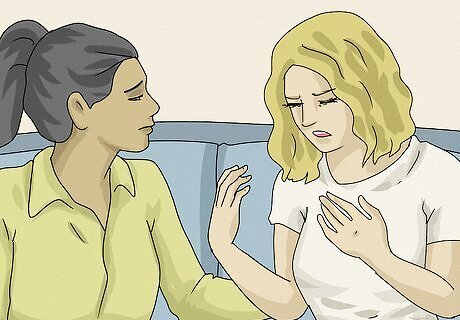
Listen when your friend wants to talk. Listening to your friend and attempting to understand what they’re going through is an important aspect of supporting them through recovery. Allow your friend to open up to you when they’re ready, and let them know that you truly want to know how they’re feeling. When they do share their experience with you, focus on listening without any judgment. Don’t pressure your friend into sharing. Just let them know that you are willing to listen when they’re ready, and give them time. Actively listen to your friend. Nod and react appropriately when they speak, and try echoing what they’ve said now and then during the conversation to let them know you’re paying attention. Focus on being understanding, validating their experience, and showing them empathy, rather than trying to jump in and “fix” things. Try not to offer any unsolicited advice or opinions. Remember, this isn’t something they can simply “get over”—it’s a serious mental health condition that will take time to heal.
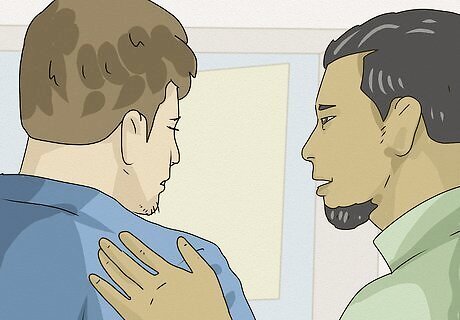
Encourage your friend and give them positive reinforcement. When someone is suffering with depression, they might be very self-critical, and they may even feel worthless. To help them through this, offer them words of support and remind them of all their positive qualities. Tell them how much they mean to you and the other people in their life. Point out your friend’s strengths and accomplishments to help build them up. For example, you could say, “You are such a gifted artist. I really admire your talent.” Or, “I think it is so amazing that you have raised three wonderful children on your own. Not everyone has that kind of strength.” Give your friend hope by reminding them that the way they are feeling is temporary. People who suffer from depression often feel like things will never get better, but you can remind them that this is not the case. Say something like, “You may not believe it now, but the way that you are feeling will change.” Avoid saying unnecessary or insensitive things like, “It’s all in your head,” or “Snap out of it!” Statements like these will likely make your friend feel worse.
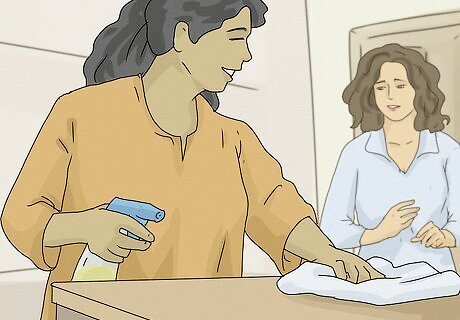
Offer to help them with daily tasks. Depression can make even small tasks extremely difficult and overwhelming. Because of this, it can be tough for people with depression to do things like clean their home, go to the grocery store, or make it to appointments. Offering your help with some of these tasks can lighten your friend’s load and show them how much you care. For example, you could offer to come over to your friend’s home over the weekend to help them tidy up and do a few loads of laundry. You could also offer to go to the grocery store and do your shopping together. This helps them with a task they're struggling with, and it’s also a way to spend time together. You can also offer to drive them to appointments, walk the dog for them, or bring dinner over for them.

Make plans with your friend. Depression can lead people to isolate themselves, and they may feel like no one cares. Extend invitations to your friend to remind them that there are people in their life who want to be around them. Ask your friend to do something fun, like going on a walk in nature, heading to the movies, or grabbing coffee together. Don’t be discouraged if your friend doesn’t say “yes” to your invitations at first, and try not to pressure them to do anything they aren’t ready to do. Just continue to extend invitations, and remind them that you care about them. Be persistent, but also patient. Remember, it doesn’t need to be a big, intricate plan—simply watching a movie at their home or hanging out on the couch together can make a huge difference.

Laugh with your friend. Laughter is known as the best medicine for a reason. It can help alleviate the symptoms of depression, and it can make people who are depressed feel more connected to others. You probably know what makes your friend laugh better than anyone else does, so make sure that you use that knowledge to laugh with them regularly! Just make sure that you only use humor in appropriate situations. If your friend is opening up to you or crying, you might not want to tell a joke at that moment. Don’t be discouraged or feel inadequate if your friend does not laugh. Depression can make it hard to feel anything at all, even good things, but this will hopefully get better with time.

Encourage your friend to practice self-care. Depression can make it tough for someone to take care of themselves. They might have less motivation to do their usual self-care practices, like getting exercise, preparing healthy food, or participating in their hobbies. To support your friend, encourage them to keep up with these activities, and offer to do some of them together. For example, if you want to help your friend stay active, invite them to a yoga class with you, or go on a walk in nature together. To help them get the nutrition they need, offer to come over to their place to cook a healthy meal together. If your friend is an avid reader, ask them if they want to go to the bookstore with you to pick out some new reads. Or, if they love art, bring some supplies over to their home so you can get creative together.
Recognizing Symptoms & Getting Your Friend Help

Watch for symptoms of depression in your friend. When someone is depressed, they may start to withdraw socially and spend more time alone. You may also notice mood changes, like increased sadness or hopelessness. If you’re unsure about whether or not your friend is depressed, look out for these symptoms: Feelings of sadness, guilt, worthlessness, or helplessness Loss of interest in things that used to bring them joy, like participating in hobbies or spending time with friends Getting irritated or frustrated more easily Loss of energy or excessive fatigue Feeling slowed down in thinking, speaking, or movement Trouble concentrating or making decisions Trouble sleeping or sleeping too much Increased or decreased appetite, which may lead to weight loss or weight gain Physical symptoms like headaches, stomach aches, digestive problems, or sexual dysfunction Thoughts of self-harm or suicide

Encourage your friend to talk to a doctor and seek treatment. As soon as you suspect that your friend is suffering from depression, encourage them to see a healthcare professional. When someone’s depressed, they might not recognize their symptoms, or they may be afraid to acknowledge them. Set aside a time to talk with your friend, and urge them to get help—this may be the push they need to seek treatment. Talk to your friend about the symptoms you’ve noticed, and tell them why you’re worried. Let them know that you care about them deeply, and you want to help. Encourage them to talk to their doctor, or to see a mental healthcare professional, such as a licensed therapist or psychologist. Reinforce the fact that depression is a mental health condition, not a character flaw or weakness, and that things can get better with treatment. You could say something like, “I'm worried about you, and I think that you should talk to a doctor about how you’ve been feeling lately. I care about you, and I want you to know that I’m here to help you in this process.”
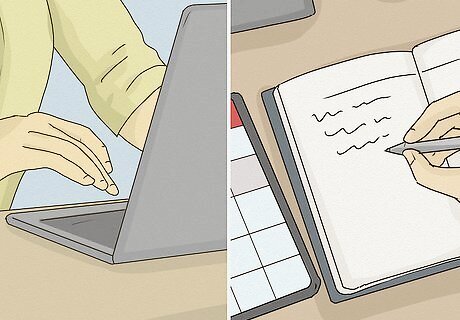
Offer to help your friend research and schedule treatment. While your friend may agree that they need to seek help, they may be too depressed to follow through with making and keeping an appointment. By offering your ongoing help, you can ensure that your friend will actually get the help they need. Help your friend research doctors, therapists, and treatment options, and offer to make the appointment yourself if they’re feeling too overwhelmed to do it. You can also offer to drive them to the appointment, or even accompany them inside the office if they need extra support. Help your friend make a list of questions to ask the doctor before the appointment.

Urge your friend to stick with their treatment. Depression treatments like psychotherapy and medication are very effective, but it may take some time to see their full effects. If your friend seems to be getting discouraged, encourage them to keep up with their doctor’s appointments and continue taking their prescribed medication. Remind them that it can take a bit of time to truly see improvements, but if they’re patient and stick with it, they will feel better!

Watch for recurrences of depression symptoms. Even if your friend is feeling better, it’s still possible that their depression symptoms could come back. In fact, it’s common for people who have depression to suffer from multiple bouts of it over their lifetime. If your friend appears to be sinking back into depression, talk to them about it and offer your support. Be on the lookout for these common triggers and signs of relapse: Return of previous symptoms, like depressed mood, loss of interest in activities, isolation or social withdrawal, changes in appetite or sleep, and feelings of worthlessness or guilt Occurrence of a stressful life event, like the death of a loved one, divorce, financial troubles, or losing a job Stopping depression treatment too early/before symptoms have fully resolved
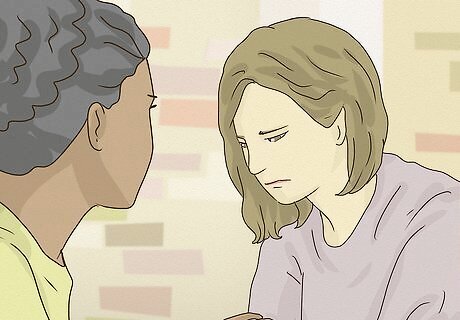
Recognize the signs of suicide. Those who have depression are at an increased risk of suicide, so it’s incredibly important to look out for any signs. If your friend talks about suicide, take it seriously. Don't assume they won't act out on their thoughts, especially when there is evidence that they have a plan. Be on the lookout for the following warning signs: Threats or talk of suicide or wanting to die Saying that they feel like they are a burden to others Increased use of drugs or alcohol Increase in dangerous or risky behaviors, like driving recklessly Statements implying they don't care about anything or won't be around anymore Giving away their possessions; making a will or funeral arrangements Making a plan to take their life, or researching ways to die The purchase of a gun or other weapon Sudden, unexplained cheerfulness or calm after a period of depression If you observe any of this behavior, get help right away! Call a health care professional, mental health clinic, or the Suicide and Crisis Lifeline at 988 to get advice about what action to take. In Canada, you can visit this website to take quick action, as well as contact the Suicide Crisis Helpline (988) for help.
Taking Care of Yourself While You Help Your Friend

Practice self-care to support your own well-being while you help your friend. Supporting a friend with depression is hard work, so it’s important to practice self-care and look after your mental and physical health. Set aside time in your schedule that’s just for you, and use that time to focus on your needs, pamper yourself, or just to do something you enjoy. Try: Taking a yoga class Taking a bubble bath Reading a book Journaling about your thoughts and feelings Meditating or praying Going for a walk or bike ride Spending time with other people who can help support and encourage you as you help your friend with depression

Maintain healthy boundaries. No matter how much you want to help, it’s important to remember that your job isn’t to “fix” your friend or take care of this crisis on your own. Offer your support and love, but don’t overextend yourself, and try to set healthy boundaries with your friend to avoid burnout. For example, you might decide to set boundaries around when you’re available for texts or phone calls. Tell your friend that you love and care for them, but you’ll be turning your phone off after 10:00 p.m. to get some rest, so you won’t be available except for emergencies. Be sure to let them know that if they do have an emergency in the middle of the night, they should call Suicide and Crisis Lifeline at 988 or call 911 as well.
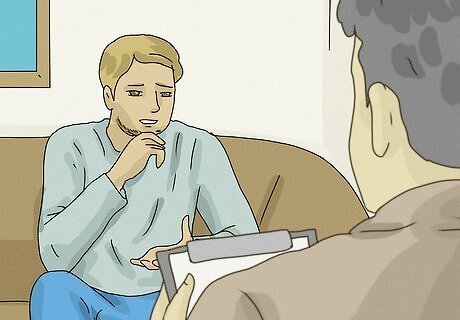
Ask for support if you’re feeling overwhelmed. Caring for a friend who has depression can be a difficult and emotional task. Reach out to friends or family to talk about the situation, or consider seeing a therapist or counselor if you’re struggling.




















Comments
0 comment